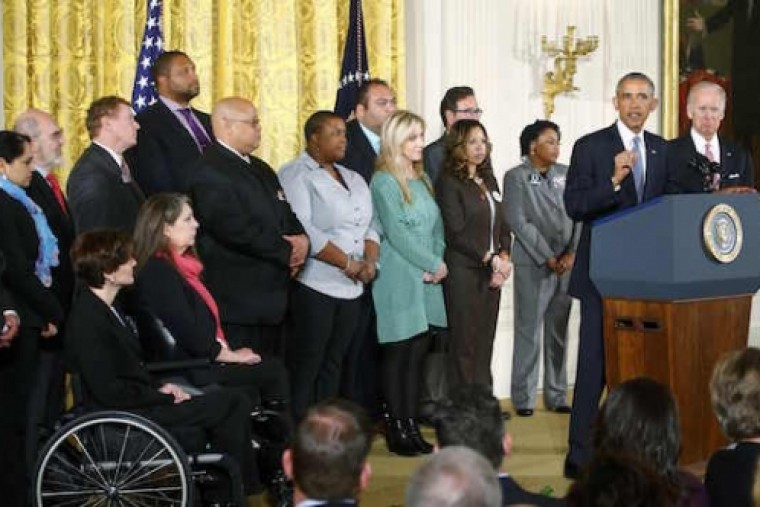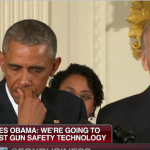
President Barack Obama’s announcement Tuesday of a series of executive actions to curb gun violence, including expanding background checks for people purchasing firearms on the private market, prompted an array of responses from leaders in the Los Angeles Jewish community.
Rabbi Hillel Cohn, rabbi emeritus of Congregation Emanu El in San Redlands, a synagogue located near the recent mass shooting at the San Bernardino Inland Regional Center, said he welcomed the remarks by the president today.
“I applaud the president,” he said in a phone interview. “The mourning and the shock of what happened in San Bernardino will ultimately subside, but the danger of guns and the destructibility of weapons will continue and we need to have much greater control over [it].”
Rabbi Aryeh Cohen, a professor at American Jewish University and rabbi-in-residence at the progressive Bend the Arc: A Jewish Partnership for Justice, offered an enthusiastic, if pragmatic response to Obama’s remarks, saying more needs to be done than was articulated by Obama earlier today.
“I thought it was a beginning of a good cultural shift, [although] the reforms he is bringing are minimal… I thought it was an important moment,” he said in a phone interview, shortly after Obama delivered his approximately 40-minute remarks on Tuesday morning from the White House. “The problem is Republicans who get elected with a stroke of a pen can undo those executive orders, but I think culturally it was an important shift.”
However, Doris Wise Montrose, president of Jews Can Shoot, a program of Children of Jewish Holocaust Survivors, denounced the remarks delivered by Obama on Tuesday, saying the steps he announced to expand background checks will not curb gun violence.
“Nothing he dealt with today is going to affect criminals, because they are criminals,” Montrose, a gun owner, said in a phone interview. “Everything is to restrict law abiding citizens from exercising second amendment rights.”
Obama said the executive actions he is using to direct federal agencies, the most he can do without the participation of Congress, include expanding the background check system so that anyone selling guns will be required to obtain a license and to conduct a background check of the person purchasing the weapon; improving the mental health care system and working on gun safety technology.
He also said that just as people have the right to own a gun, as stated in the second amendment, so to do people have a right to worship – citing mass shootings at a church in Charleston, S.C., this past June; at a Kansas Jewish community center in 2014 which resulted in the death of three non-Jews; at a condominium complex in Chapel Hill that resulted in the deaths of Muslims and at a Sikh temple in Wisconsin in 2012.
“Our right to worship freely and safely, that right was denied to Christians in Charleston, South Carolina, that was denied Jews in Kansas City, that was denied Muslims in Chapel Hill and Sikhs in Oak Creek,” he said. “They have rights, too.”
In attendance at the speech was Jewish former Arizona Congresswoman Gabrielle Giffords, who was shot point blank by a gunman during a rally in Tucson in 2011.
Whether or not Obama’s executive actions can reduce gun violence, Cohen, for his part, referred to deaths in the U.S. by gun violence as an “astounding mind-boggling phenomenon.” According to whitehouse.gov, “more than 30,000 Americans die from gun violence every year.”
“I think it clearly should be a priority for the American body politic,” Cohen said of curbing gun violence. “It clearly should be a priority for the Jewish community in terms of pikuah nefesh,” referring to the Jewish obligation to save a life in jeopardy.
by Ryan Torok



